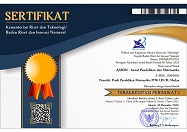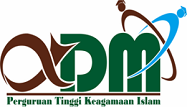Author Guidelines
The manuscripts
The manuscript should be an original research paper that sufficiently contributes novelty to mathematics education. Authors are requested to submit their papers electronically by using the AXIOM : Jurnal Pendidikan dan Matematika online submission procedure and use AXIOM template. The Editors will ignore submissions that do not follow these procedures.
Structure of the manuscripts
1. Title. The title should be clear and informative.
2. Author's names and institutions. The author's names should be accompanied by the author's institutions and email addresses, without any academic title. For a joint paper, one of the authors should be notified as to the corresponding author.
3. Abstract and keywords. The abstracts consist of 150-200 words. No citation; State in the abstract a primary objective, research design, methodology, main outcomes and results, and the conclusions; The keywords should be of max to 5 phrases.
4. Introduction. This section explains the background of the study, a review of the previous researches in the area, and aims of the manuscripts. Importantly it should also show the significance and novelty of the research.
5. Methods. This section describes the appropriate tools of analysis along with the data and their sources.
6. Results. This section explains the results of the study. It should be presented clearly and concisely.
7. Discussion. This section links the research findings with previous research findings and relevant theories, the contribution of the work to the education literature, research limitations and implications for practice and future research.
8. Conclusion. This section concludes and provides policy implications, if any, of the study. The conclusion(s) should be in the same order with ones discussed in the body of the manuscript.
9. Acknowledgement (if any).
10. Declaration. This section concludes author contribution, funding statement (if any), conflict of interest, and additional information (if any). [Starting from volume 13 no. 1]
11. References. This section lists only the papers, books, or other types of publications referred to in the body of the manuscript. (note: The manuscript is expected to involve a minimum of 25 primary and up-to-date references in last 8 years to assert high-quality contributions to knowledge development). [Starting from volume 13 no. 1]
General Writing Format
1. The manuscript is prepared in an A4 paper, double-sided, and 1,15 lines spacing format. A new paragraph should start 5 characters from the left margin, using 12-size, Times New Roman font type.
2. The manuscript is written in Indonesian or English.
3. The manuscript should be between 10 to 15 pages long (min. 4000 words).
4. The top, right, bottom, and left margin 2,5 cm.
5. The title is written using sentence case (capital letter only at first letter in the first word), 16 font size, left alignment.
6. Subtitles are written using sentence case (capital letter only at first letter in the first word or special name), 12 font size, with numbering.
7. Sub of subtitles, if any, are written using capital letters only at first word or special name, 12 font size, with numbering.
8. Sub of the sub of subtitles, if any, are written using capital letters only at the beginning of each word except for connecting words. They should be started from the left margin.
9. References should be to the most pertinent and up-to-date sources (involve a minimum of 25 primary and up-to-date references in last 8 years). References are written in APA style 7th ed. Each citation should be written in the order of appearance in the text. Please use a consistent format for references.
Specific Writing Format
Estimation results from a software package are not allowed to be directly presented in the paper. They should be presented in summary tables.
Tables and Figures
Tables and figures should be presented as follows: The name of tables and figures should follow a numbering system (Arabic numbering system). The title of the tables and figures are placed at the top and the bottom respectively.
Subjects and Authors Index
The authors should provide an index of the subject, namely the specific terms in the manuscript. The authors should also provide the index of authors, namely the key authors of papers referred to in the manuscript. Please write the family name followed by the given name.
Citation
Citation in the text body should be written using the family name and years of publication. Example:
a. Hill (2001) suggests that the objective of depreciation is...
b. Inflation targeting would be sufficient (McCain, 1982).
c. The definition of contagion is ... (Wagner, 1976; Rhonda 2009).
d. The Authors are recommended to use Mendeley Reference software.
References
Citations and references must strictly follow the APA (American Psychological Association) 7th edition style. References should include only works that are cited within the text of the manuscript. Consulting the APA style manual (http://www.apastyle.org/pubmanual.html) is strongly recommended for completing manuscript submissions.
References should appear as:
Book with one author:
Author, A. A. (2005). Title of work. Publisher.
Book with two authors:
Author, A. A., & Author, B. B. (2005). Title of work. Publisher.
Book with more than two authors:
Author, A. A., Author, B. B., & Author, C. C. (2005). Title of work. Publisher.
Journal article:
Mashuri, S., Djidu, H., & Ningrum, R. (2019). Problem-based learning dalam pembelajaran matematika: Upaya guru untuk meningkatkan minat dan prestasi belajar siswa.
Pythagoras: Jurnal Pendidikan Matematika, 14(2), 112 - 125.
https://doi.org/10.21831/pg.v14i2.25034
A publication in press:
Kuncoro, H. (in press). Does sustainable fiscal policy foster its credibility? Economic Journal of Emerging Markets.
Edited book:
Gregoriou, G. N. (Ed.). (2009). Emerging Markets: Performance, Analysis, and Innovation. CRC Press.
Chapter in an edited book:
Courant, P. N., Gramlich, E. M., & Rubinfeld, D. L. (1979). The stimulative effects of intergovernmental grants: or why money sticks where it hits. In P. Mieszkowski, & W. H. Oakland (Eds.), Fiscal federalism and grants-in-aid (pp. 5-21). The Urban Institute.
Web site:
Prasetyo, P. E., Sudarma, K., & Sulaha, A.S. (2014). Economic policy impact on competitiveness and efficiency of textile industry in central Java. Economic Journal of Emerging Markets, 6(2), 85-95. http://journal.uii.ac.id/index.php/JEP/issue/view/417
Unpublished doctoral dissertation or master’s thesis:
Mosquera, C. M. R. (2009). Essays on economic growth, financial integration and exchange rates. Unpublished doctoral dissertation, University of Pittsburgh, Pennsylvania.
Published proceedings:
Altinbas, H., & Biskin, O.T. (2015). Selecting macroeconomic influences on stock markets by using feature selection algorithms. In E. Hromada (Ed.), IISES 3rd and 4th Economics and Finance Conference: Vol. 30. Procedia Economics and Finance (pp. 22-29). London: International Institute of Social and Economic Sciences.
A presented paper:
Lagos, Ricardo. (2009, October). Asset Prices, Liquidity, and Monetary Policy in an Exchange Economy. Paper presented at the Annual Economic Policy Conference of the FRB of St. Louis: "Debt, Financial Markets, and Monetary Policy", Federal Reserve Bank of St. Louis, US.
How to send the manuscript
1. The manuscript in Microsoft Word, RTF, or WordPerfect document file format (don't use another format), use AXIOM template, should be sent to the editor by clicking the Online Submission tab on our Website.
2. A brief bio that contains full name, academic title, institution, telephone, mobile number, and others should be written in the fields of data when registering online in the website submission. Final Decision Taking into account the results of the peer-reviewing process, the decision as to the acceptability of each manuscript for publication will be notified to the author(s) through the website system in the following alternative conclusions:
a. Accepted without revision, or
b. Accepted with minor revision, or
c. Accepted with major revision, or
d. Rejected.











